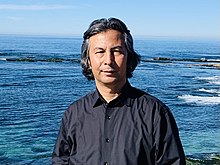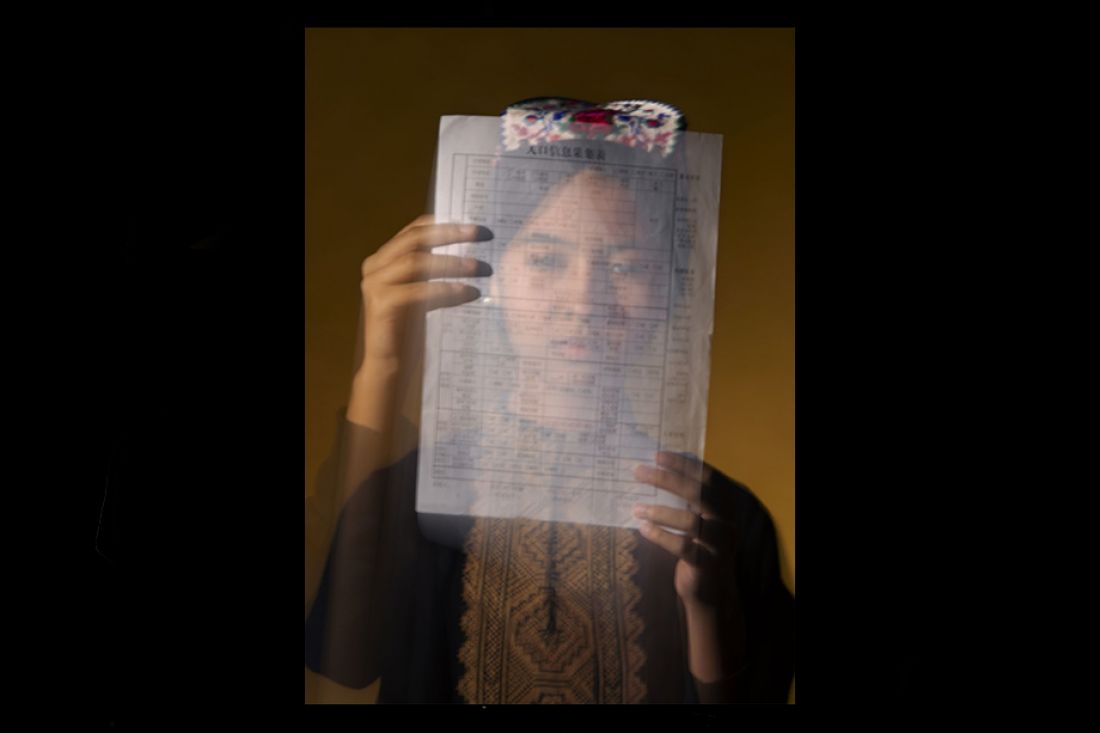我的一片肉
撕掉了。
我的一片骨
折断了。
我的一片魂
再造了。
我的一片思想
自由了。
在她瘦弱手上
时间线已长长。
在她黑眼珠里
浮现石碑真相。
在她纤细颔颈
深色发辫绕项。
在她黑皮肤上
水果地图绘像。
她
是我脸一滴雨丝,半透明
我看不见的来日。
她
是不需解的结子
像我血从天空所描公式,
淌自历史的预示。
她
亲吻我坟头碑石
它压住我的遗尸
并把我托付于斯。
她
是一名厄运咒师
使我成为创制者
并继续我的创制。
她就是我的女儿。
原注:这张(题标)照片由黃郁菁拍摄,是有关维吾尔人身份摄影展的一部分。在照片中,阿斯娜·塔依尔·伊兹吉尔(Aséna Tahir Izgil)握着中国新疆当局所用表单,该表单利用民族和宗教信仰等分类,计算穆斯林公民“可靠性”。正是这张表单及其所代表的压迫性官僚主义,迫使阿斯娜、塔依尔及其他家人逃离家园。在此照片中,阿斯娜对抗地举起并直视该表单。
2020年5月15日
(张裕译自乔舒亚·弗里曼的英译,2024年9月24日)
译注:塔依尔・哈穆特・伊兹格尔(Tahir Hamut Izgil,又译塔希尔·哈木特·伊兹吉尔)是著名维吾尔诗人、电影导演,定居美国的流亡作家;1969年出生于喀什,17岁时发表第一首诗,19岁到北京中央民族大学学习维汉双语文学,饱读中国及西方现代诗与西方文学,以现代主义诗歌创作见长。1989年北京学生运动时,他领导了维吾尔学生参加游行等抗议活动;大学毕业后被分配到北京中共中央党校任维语教师。1996年,他从乌鲁木齐前往土耳其留学时被捕,以“向境外提供国家秘密”的罪名受监禁三年;1999年获释后回乌鲁木齐,后成为一位知名导演。2017年,在中国新疆维吾尔自治区当局推行”再教育营”等大规模逮捕关押的恐怖压迫下,他及家人逃往美国避难。塔依尔著有诗集《距离与其他》(The Distance and Other Poems)和回忆录《等待在夜里被捕》(Waiting to be Arrested at Night)等;2024年5月和9月先后荣获美国人权基金会“瓦茨拉夫·哈维尔创意异议人士奖”(Václav Havel Prize for Creative Dissent)和瑞典诗歌奖“蝉奖”(Cikadapriset)。

ASÉNA
By Tahir Hamut Izgil
A piece of my flesh
torn away.
A piece of my bone
broken off.
A piece of my soul
remade.
A piece of my thought
set free.
In her thin hands
the lines of time grow long.
In her black eyes
float the truths of stone tablets.
Round her slender neck
a dusky hair lies knotted.
On her dark skin
the map of fruit is drawn.
She
is a raindrop on my cheek, translucent
as the future I can’t see.
She
is a knot that need not to be untied
like the furmula my blood traced from the sky,
an omen trickling from history.
She
kisses the stone on my grave
that holds down my corpse
and entrusts me to it.
She
is a luckless spell
who made me a creator
and carried on my creation.
She is my daughter.
(Translation from Uyghur: Joshua Freeman May 15 2020)
The photo was taken by Yu-Jing Huang as part of a photo exhibition on Uyghur identity. In the image, Aséna Tahir Izgil is holding the form used by Chinese authorities in Xinjiang to calculate Muslim citizens’ “reliability,” using categories like ethnicity and religiosity. It was this form, and the repressive bureaucracy it represents, that forced Tahir, Aséna, and the rest of their family to flee their homeland. Here, Aséna defiantly holds up the form and looks straight through it.
来源:penopp.org

